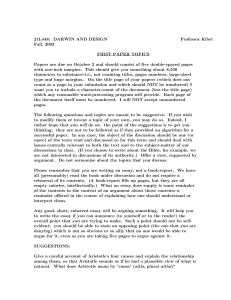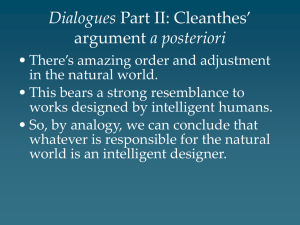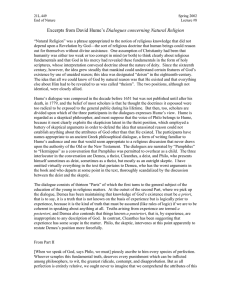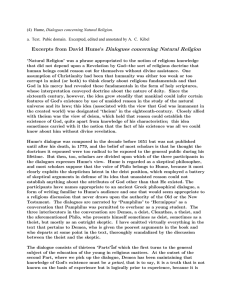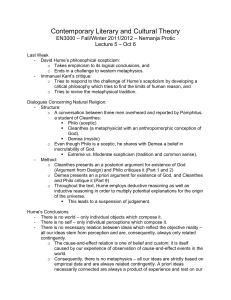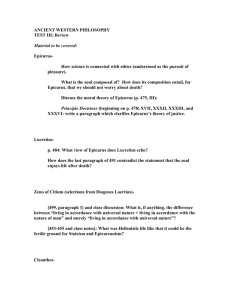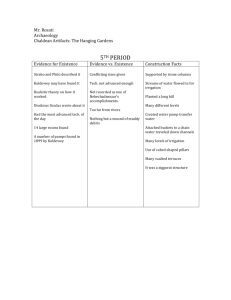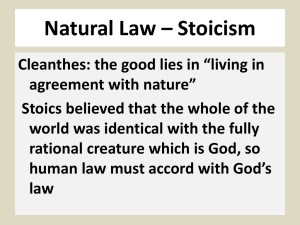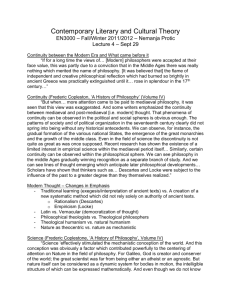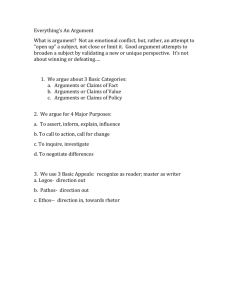Study Questions for Hume, Dialogues Concerning Natural Religion
advertisement
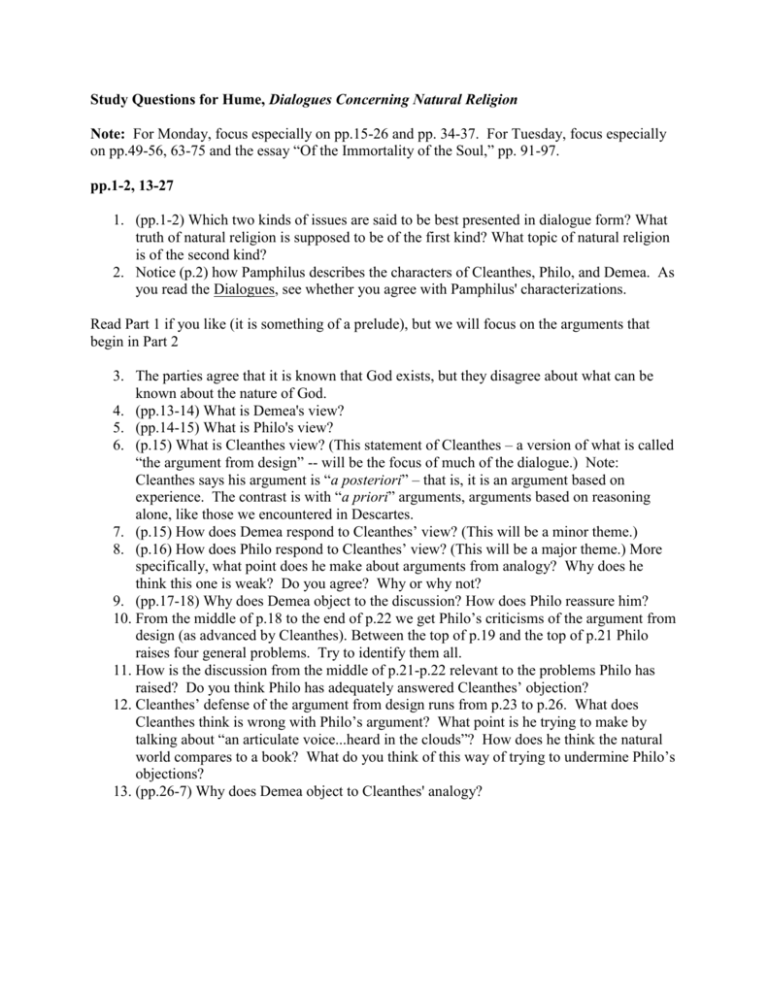
Study Questions for Hume, Dialogues Concerning Natural Religion Note: For Monday, focus especially on pp.15-26 and pp. 34-37. For Tuesday, focus especially on pp.49-56, 63-75 and the essay “Of the Immortality of the Soul,” pp. 91-97. pp.1-2, 13-27 1. (pp.1-2) Which two kinds of issues are said to be best presented in dialogue form? What truth of natural religion is supposed to be of the first kind? What topic of natural religion is of the second kind? 2. Notice (p.2) how Pamphilus describes the characters of Cleanthes, Philo, and Demea. As you read the Dialogues, see whether you agree with Pamphilus' characterizations. Read Part 1 if you like (it is something of a prelude), but we will focus on the arguments that begin in Part 2 3. The parties agree that it is known that God exists, but they disagree about what can be known about the nature of God. 4. (pp.13-14) What is Demea's view? 5. (pp.14-15) What is Philo's view? 6. (p.15) What is Cleanthes view? (This statement of Cleanthes – a version of what is called “the argument from design” -- will be the focus of much of the dialogue.) Note: Cleanthes says his argument is “a posteriori” – that is, it is an argument based on experience. The contrast is with “a priori” arguments, arguments based on reasoning alone, like those we encountered in Descartes. 7. (p.15) How does Demea respond to Cleanthes’ view? (This will be a minor theme.) 8. (p.16) How does Philo respond to Cleanthes’ view? (This will be a major theme.) More specifically, what point does he make about arguments from analogy? Why does he think this one is weak? Do you agree? Why or why not? 9. (pp.17-18) Why does Demea object to the discussion? How does Philo reassure him? 10. From the middle of p.18 to the end of p.22 we get Philo’s criticisms of the argument from design (as advanced by Cleanthes). Between the top of p.19 and the top of p.21 Philo raises four general problems. Try to identify them all. 11. How is the discussion from the middle of p.21-p.22 relevant to the problems Philo has raised? Do you think Philo has adequately answered Cleanthes’ objection? 12. Cleanthes’ defense of the argument from design runs from p.23 to p.26. What does Cleanthes think is wrong with Philo’s argument? What point is he trying to make by talking about “an articulate voice...heard in the clouds”? How does he think the natural world compares to a book? What do you think of this way of trying to undermine Philo’s objections? 13. (pp.26-7) Why does Demea object to Cleanthes' analogy? Study Questions for Hume, Dialogues Concerning Natural Religion , Parts IV-VI 1. (pp.28-29) Why does Cleanthes reject Demea’s objection? Why does he say that mystics are atheists? 2. (pp.30-32) Philo argues that one cannot establish that the universe was created in accordance with a plan in the mind of God. What is his argument? 3. (pp.32-33) What is Cleanthes’ answer? 4. (p.33) What is Philo’s response to Cleanthes? 5. (pp.34-35) Philo begins by restating one of the premises of Cleanthes' a posteriori argument: "Like effects prove like causes." He then launches into an account of some of the recent discoveries by means of telescopes and microscopes. Why? In other words, what do these discoveries imply for Cleanthes' analogy between the universe and human artifacts? 6. (pp.35-41) Philo argues that if the argument from design were any good, it would establish that God is finite and imperfect, and that there are many gods, and that the gods are immortal, and they come in two sexes, and have eyes, a nose, ears, etc. Further, the universe turns out to be an animal. Why does he conclude these things? 7. (pp.41-42) Cleanthes thinks that the universe turns out to be more like a vegetable than an animal. But more important, Cleanthes thinks that on Philo’s view the universe is eternal (has always existed), and he thinks that can be shown to be false. How? Parts VII-IX 1. (Pp.44-46) Philo continues, arguing that Cleanthes’ principles lead to the conclusion that our universe is generated from previous universes, as animals or vegetables are propagated. What is his argument? Do you think he is really committed to the truth of this claim? If so, why? If not, why would he suggest it? 2. (P.46) Demea suggests that, if our universe was produced in the way vegetables are, this still needs to be explained, and a designer must be postulated to explain it. How does Philo reply (pp.46-48)? 3. On p.48 Cleanthes admits that he has no immediate reply, but he discounts Philo’s arguments. What does he say about them? 4. In Section VIII (pp.49-53) Philo suggests yet another hypothesis to explain the order in the world: that random change, if continued long enough, may eventually produce an orderly arrangement. Once produced, this order would be stable if, like the order in our present world, it was self-replicating. How is this relevant to the argument from design? How close is Philo’s hypothesis to Darwin’s theory of natural selection? 5. What conclusion does Philo put forward at the end of this section (p.53)? 6. In Section IX Demea suggests it would be better to rely on the kind of arguments that some theologians have previously given, arguments that are a priori instead of a posteriori – that is, arguments that proceed from reasoning alone without relying on any observations at all. What argument does Demea give (pp.54-55)? 7. Both Cleanthes and Philo reject this type of argument. What is Cleanthes’ objection (pp.5556)? Why does he think that any such proof would be an absurdity? What is Philo’s objection (pp.56-57)? Study Questions for Hume, Dialogues Concerning Natural Religion, Parts X-XII 1. On pp.58-62 Philo and Demea take turns developing the notion that human life is mostly miserable, burdened as it is with pain, death, disease, oppression, depression, etc., etc., etc. What do you think of their case? 2. On p. 63 Philo states what is traditionally called “the Problem of Evil.” What exactly is the problem? 3. On p. 64 Demea claims to have a solution to the problem. What is it? 4. Why does Cleanthes reject Demea’s solution? (P.64) 5. What solution does Cleanthes propose? (Pp.64-65) 6. Why does Philo reject Cleanthes’ solution? (P.65) 7. How does he then argue that, even if Cleanthes had his facts right, his argument would still be faulty? (bottom of 65-top of 66) 8. How does he then argue that, even if Cleanthes could show that the misery in the world is “compatible with infinite power and goodness in the Deity,” that misery would still undermine Cleanthes argument for the existence of such a Deity”? (P.66, middle) 9. On p.67 Cleanthes proposes to think of God not as infinitely perfect, but as “finitely perfect” (that is, somewhat limited in knowledge or power). What solution to the problem of evil does this permit? 10. Philo again (pp.68-69) draws a distinction between two questions: 11. Is the evil (or misery) in the world logically inconsistent with the supposition that there is a God? (If so, then the presence of evil would be a proof that God does not exist. But, even if not, Cleanthes still has a problem, which is brought out by the other question.) 12. Does the evil (or misery) in the world undermine efforts (like Cleanthes’) to use the nature of the world as evidence for the existence and nature of God? 13. Philo wants to show that even if we answer “no” to the first question, we surely must answer “yes” to the second one, and therefore reject Cleanthes’ argument from design. What do you think? 14. On pp.69-73 Philo describes four circumstances that, he says, are responsible for most of the “natural evil” in the world. What are they? 15. Philo claims (p.74 and several times earlier) that these circumstances “might ... easily have been remedied.” Do you agree? 16. Note the paragraph that starts at the middle of p.74. What do you think of Philo’s ‘take’ on nature? 17. On p.75 Demea (finally) notices that Philo’s arguments may be undermining religious belief (as Demea conceives it) and not just defending it from Cleanthes’ “anthropomorphism.” He asks, “Are you secretly, then, a more dangerous enemy than Cleanthes himself?” What do you think? 18. Part XII is notoriously confusing. Why, after seeming to give Philo the best arguments so far, does Hume have Pamphilus say at the end that Cleanthes’ principles are best? Why does Philo seem to accept, in the end, a version of the argument from design (albeit one with a very watered-down conclusion)? Is Hume expressing his own view when he has Philo say that philosophical skepticism (by destroying the pretensions of reason and clearing the way for faith) is “the first and most essential step towards being a sound, believing Christian?” You might want to read the editor’s attempt to sort these matters out in the introduction, pp. xiii-xvii.
